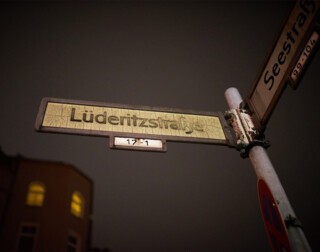In the Afrikanisches Viertel
Harry Stopes
I moved to the Afrikanisches Viertel, in Wedding, about a month after I arrived in Berlin. Most of the streets are named for places in Africa – Togostraße, Windhukerstraße – but Nachtigalplatz commemorates Gustav Nachtigal, Bismarck’s Reichskommissar for West Africa, and Lüderitzstraße is named for the founder of German South West Africa.
Only one of these colonial names has been changed – sort of. In 1986, the city announced that Petersallee now referred to Hans Peters, a co-founder of the CDU and a member of the Kreisau Circle of wartime resisters. Small panels were attached to the street signs giving his name and dates. But the street was originally named for Carl Peters, an imperial high commissioner of northern Tanganyika in the 1890s and a notoriously brutal, violent racist, condemned even in his own time.
The neighbourhood is a place of colonial commemoration, activists say, not so much an Afrikanisches but a Kolonialistisches Viertel. They are campaigning to get the streets renamed after Africans who resisted colonial rule: Cornelius Frederiks, a Nama leader who died in a German concentration camp in 1907; Anna Mungunda, who was killed in the Old Location uprising in Windhoek in 1959; Manga Bell, who was hanged for treason in Cameroon in 1914; and the Maji Maji rebels in German East Africa (modern Tanzania) in 1905-7. The changes were agreed in principle by the Berlin Mitte borough council last year, with votes from the ruling coalition of SDP, Green and Die Linke. The AfD and CDU were opposed.
The CDU have been fighting against the change for years. In the 2011 Berlin state elections they posted material around the neighbourhood with the slogan ‘against the renaming of streets in the African Quarter’ and a photo of a sign for Kamerunerstraße: a dishonest sleight of hand, since no one had suggested changing the geographical street names. The CDU eventually proposed resolving the situation by repeating the Petersallee trick, rededicating Nachtigalplatz to Johann Karl Christoph Nachtigal (1753-1819), a theologian and folklorist, and Lüderitzstraße to the Namibian port of Lüderitz – never mind that the city is itself named after the same man.
Reactions in the neighbourhood have been mixed. One elderly activist, of Tanzanian origin, had eggs thrown at him while he was giving a tour to supporters. An anonymous open letter published a few years ago alleged that demands to change the street names threatened ‘the peaceful co-existence between old and new residents of Wedding’.
‘There are many people who don’t care either way, there are people who want to confront us, but there are people who appreciate what we’re doing,’ Joshua Kwesi Aikins, an activist and academic, told me. ‘Once I was giving a tour and an old white lady shouted at me from the window of an apartment: “You! Wait, I’m coming down.” I was expecting a confrontation, but actually when she got down she brought me a beer. When she realised I didn’t have an opener she ran to get one for me. I’ve still got it somewhere.’
A local association, the Initiative Pro Afrikanisches Viertel (IPAV), has been drumming up residents to object to the changes formally, posting a template letter to the council on their website. They will probably try to organise a legal challenge too, according to the Tagesspiegel journalist Laura Hofmann. The group’s spokespeople are both active in the local CDU. They say they respect the ‘sincerity’ of those advocating change, but the ‘arbitrary’ selection of names doesn’t represent the necessary ‘conscious confrontation with our historical heritage’. The names seem anything but arbitrary, however, and it’s hard to see how the IPAV’s preferred solution (leave the names as they are and pull the Peters trick) would represent any kind of confrontation with history at all.
Some journalists have not been so delicate. The Die Welt columnist Alan Posener has written that imposing new street names on the residents would itself be a colonial act. He thinks it would be a mistake to name a street after Anna Mungunda – a domestic worker whose son had been shot dead by colonial forces – because enduring inequality in post-independence Namibia undermines, in his view, the whole premise of decolonisation. Approximately 70 per cent of the farmland in Namibia is currently owned by whites, many of them German or South African nationals. Posener also claimed that efforts to rename the streets would only push local voters towards the AfD.
‘I’m not saying everyone in this neighbourhood supports this colonial symbolism,’ Aikins said on a recent tour, ‘but some do.’ He stopped in the allotments at the top of Lüderitzstraße to point out a plot with the flag of the German empire flying over it.

Comments
Might it be possible somehow to augment these remnants of Germany's short and brutal colonial past with some equivalent of the brilliant Stolpersteine? If each colonial street name was tagged with a reminder of the immense damage it represents, they might yet do some good.